
Politics of Bangladesh takes place in a framework of a parliamentary representative democratic republic, whereby the Prime Minister of Bangladesh is the head of government, and of a multi-party system. Executive power is exercised by the government. Legislative power is vested in both the government and parliament. The Constitution of Bangladesh was written in 1972 and has undergone seventeen amendments.

Bangladesh elects on national level a legislature with one house or chamber. The unicameral Jatiyo Sangshad, meaning national parliament, has 350 members of which 300 members are directly elected through a national election for a five-year term in single-seat constituencies while 50 memberships are reserved for the women who are selected by the ruling party or coalition. The Prime Minister is the head of the government. The president who is the head of the state is elected by the National Parliament. The president of Bangladesh is a ceremonial post and does not exercise any control over the running of the state.

Since its establishment in 1947, Pakistan has had an asymmetric federal government and is a federal parliamentary democratic republic. At the national level, the people of Pakistan elect a bicameral legislature, the Parliament of Pakistan. The parliament consists of a lower house called the National Assembly, which is elected directly, and an upper house called the Senate, whose members are chosen by elected provincial legislators. The head of government, the Prime Minister, is elected by the majority members of the National Assembly and the head of state, the President, is elected by the Electoral College, which consists of both houses of Parliament together with the four provincial assemblies. In addition to the national parliament and the provincial assemblies, Pakistan also has more than five thousand elected local governments.
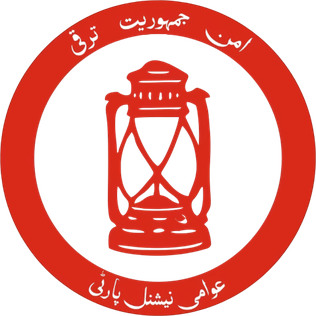
The Awami National Party is a Pashtun nationalist, secular and leftist political party in Pakistan. The party was founded by Abdul Wali Khan in 1986 and its current president is Asfandyar Wali Khan, grandson of Bacha Khan, with Mian Iftikhar Hussain serving as the Secretary-General. Part of the PPP-led cabinet of the Pakistani government during 2008−13, ANP's political position is considered left-wing, advocating for secularism, public sector government, and social egalitarianism.

The Pashtunkhwa Milli Awami Party, abbreviated as PMAP or PKMAP, is a political party in Pakistan's Balochistan province. It was founded by Mahmood Khan Achakzai, who was elected as the chairman, and Sher Ali Bacha, who served as the General Secretary, in March 1989 in Quetta.
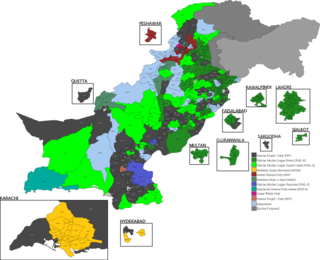
General elections were held in Pakistan on 18 February 2008 to elect members of the 13th National Assembly and the four Provincial Assemblies.
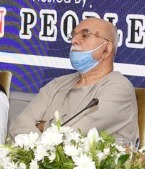
Mahmood Khan Achakzai is a Pakistani Pashtun regionalist politician who is the Chairman of Pashtunkhwa Milli Awami Party. Achakzai completed his Engineering degree from the Peshawar University of Engineering and Technology. In 7th National Congress of Pashtunkhwa Milli Awami Party on 19, 20 December 2022 Mahmood khan Achakzai re elected as the Chairman Of PkMAP.

General elections were held in Pakistan on 7 December 1970 to elect members of the National Assembly. They were the first general elections since the independence of Pakistan and ultimately the only ones held prior to the independence of Bangladesh. Voting took place in 300 general constituencies, of which 162 were in East Pakistan and 138 in West Pakistan. A further thirteen seats were reserved for women, who were to be elected by members of the National Assembly.

General elections were held in Pakistan on Wednesday, 25 July 2018 to elect the members of 15th National Assembly and the four Provincial Assemblies. The three major parties were Pakistan Tehreek-e-Insaf (PTI) led by Imran Khan, the Pakistan Muslim League led by Shehbaz Sharif and the Pakistan Peoples Party led by Bilawal Bhutto. The PTI won the most seats in the National Assembly but fell short of a majority; the party subsequently formed a coalition government with several smaller parties. At the provincial level, the PTI remained the largest party in Khyber Pakhtunkhwa (KP); the Pakistan Peoples Party (PPP) retained its dominance in Sindh and the newly formed Balochistan Awami Party (BAP) emerged as the largest party in Balochistan. In Punjab, the result was a hung parliament with the Pakistan Muslim League (N) winning the most seats. However, after several independents MPAs joined the PTI, the latter became the largest party and was able to form a government.

Senate elections were held in Pakistan on 5 March 2015 to elect the replacements for 52 retiring senators. Those retiring include chairman Nayyar Hussain Bukhari and deputy chairman Sabir Ali Baloch of the upper house. Pakistan Peoples Party (PPP), the majority party in Senate, would lose 21 members, followed by Pakistan Muslim League Nawaz would lose 9 and Awami National Party would lose 6 members.
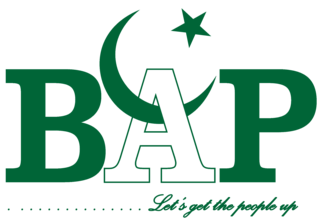
Balochistan Awami Party is a political party based in the Balochistan province of Pakistan founded in 2018 by political dissidents of the Pakistan Muslim League (N) and the Pakistan Muslim League (Q) in Balochistan.
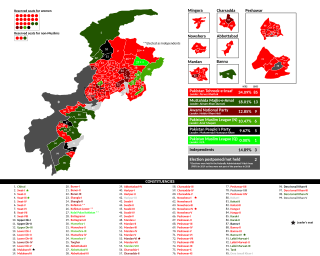
Provincial elections were held in the Pakistani province of Khyber Pakhtunkhwa on 25 July 2018 to elect the members of the 11th Provincial Assembly of Khyber Pakhtunkhwa, alongside nationwide general elections and three other provincial elections in Sindh, Balochistan and Punjab. The remaining two territories of Pakistan, AJK and Gilgit-Baltistan, were ineligible to vote due to their disputed status.

Provincial elections were held in the Pakistani province of Balochistan on 25 July 2018. Newly formed Balochistan Awami Party (BAP) emerged as the largest party by winning 24 seats followed by Muttahida Majlis-e-Amal who won 10 seats. Pakistan Tehreek-e-Insaf won 7 seats for the very first time.
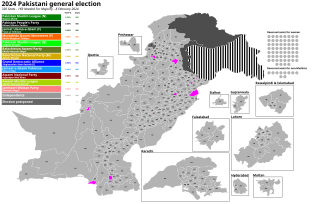
General elections are scheduled to be held in Pakistan on 8 February 2024 to elect the members of the 16th National Assembly. The detailed schedule was announced by Election Commission of Pakistan on 15 December 2023.

Provincial elections were held in the Pakistani province of Khyber Pakhtunkhwa's constituencies belonging to areas previously known as the Federally Administered Tribal Areas (FATA) on 20 July 2019. After the election, the new members joined the already elected members from the rest of the province to complete the formation of 11th Provincial Assembly of Khyber Pakhtunkhwa.
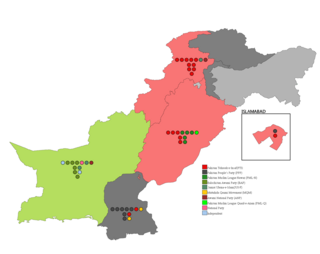
The 2021 Pakistani Senate election was held on 3 March 2021. The Election commission of Pakistan announced the election schedule on 11 February 2021. 52 of the 104 Senators had retired on 7 February 2021. After the merger of the Federally Administered Tribal Areas with Khyber Pakhtunkhawa, FATA seats were abolished and there was no election on 4 of the 8 seats. The rest of the 4 seats will be abolished in 2024. Official results of the Senate Elections were announced by the Election Commission of Pakistan on 10 March 2021.
On June 24, 2022, the first round of local body elections were held in 14 districts of Sindh. According to the results, the Pakistan People's Party has won 225 seats in the municipal committee. GDA has won 18 seats while 19 independents have won, PTI has won 14 and JUI has won 7 seats while other parties have won two seats.

Provincial elections are scheduled to be held in Balochistan on 8 February 2024 to elect a new provincial legislature. On 5 August 2023, after the approval of the results of the 2023 digital census by the Council of Common Interests headed by Prime Minister Shehbaz Sharif, elections have been delayed for several months, as new delimitations will be published on 14 December 2023. On 2 November 2023, the Election Commission of Pakistan announced, in agreement with the President of Pakistan, Arif Alvi, that the elections will be held on 8 February 2024. This election will be held concurrently with nationwide general elections and other provincial elections.
The 2015 Balochistan local government elections were held in the Pakistani province of Balochistan on 29 May 2015. The elections were held for the first time in the province after the passage of the Balochistan Local Government Act 2013. The elections were contested by a total of 1,260 candidates, including 620 men and 640 women. The Muttahida Qaumi Movement-Pakistan (MQM-P) emerged as the largest party in the elections, winning 280 seats. The Balochistan Awami Party (BAP) won 250 seats, the Pakistan Tehreek-e-Insaf (PTI) won 170 seats, and the Balochistan National Party-Mengal (BNP-M) won 100 seats. The remaining 100 seats were won by independent candidates.















